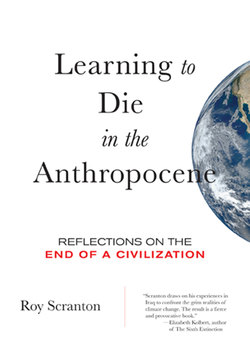Learning to Die in the Anthropocene

Реклама. ООО «ЛитРес», ИНН: 7719571260.
Оглавление
Roy Scranton. Learning to Die in the Anthropocene
Отрывок из книги
PRAISE FOR ROY SCRANTON AND
LEARNING TO DIE IN THE ANTHROPOCENE
.....
Admittedly, ocean acidification, social upheaval, and species extinction are problems that humanities scholars, with their taste for fine-grained philological analysis, esoteric debates, and archival marginalia, might seem remarkably ill-suited to address. After all, how will thinking about Kant or Frantz Fanon help us trap carbon dioxide? Can arguments between object-oriented ontology and historical materialism protect honeybees from colony collapse disorder? Are ancient Greek philosophers, medieval poets, and contemporary metaphysicians going to save Bangladesh from being inundated by the Indian Ocean?
Perhaps not. But the conceptual and existential problems that the Anthropocene poses are precisely those that have always been at the heart of humanistic inquiry: What does it mean to be human? What does it mean to live? What is truth? What is good? In the world of the Anthropocene, the question of individual mortality—What does my life mean in the face of death?—is universalized and framed in scales that boggle the imagination.21 As environmental philosopher Dale Jamieson puts it, “The Anthropocene presents novel challenges for living a meaningful life.”22 Historian and theorist Dipesh Chakrabarty has claimed that global warming “calls us to visions of the human that neither rights talk nor the critique of the subject ever contemplated.”23 Whether we are talking about ethics or politics, ontology or epistemology, confronting the end of the world as we know it dramatically challenges our learned perspectives and ingrained priorities. What does consumer choice mean compared against 100,000 years of ecological catastrophe? What does one life mean in the face of mass death or the collapse of global civilization? How do we make meaningful decisions in the shadow of our inevitable end?
.....